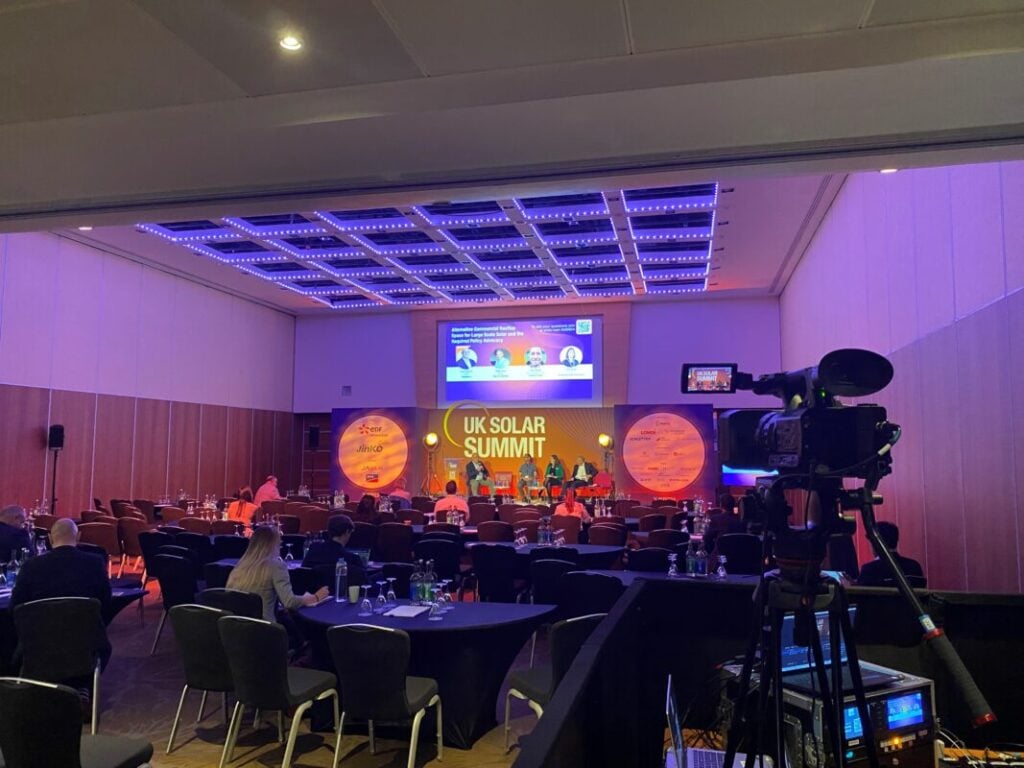
According to Connie Duxbury, founder of Croydon Community Energy and community manager at Younity, who spoke at the UK Solar Summit in London today, there is a “lack of awareness” that the community solar energy sector “even exists” in the UK.
Duxbury and fellow panellists Liz Leffman, leader of Oxfordshire County Council, and Nadia Smith, Director of Community Energy London, said that the lack of awareness is largely due to a lack of support from both local and national government.
Duxbury said: “There’s no national community energy strategy from the top down. Some [local authorities] are really supportive and set up community energy funds; some are not interested or don’t have any money. If there was some national guidance…to guide the local authorities, I think that would really help.”
Leffman, a Councilor in Oxfordshire, said: “It’s down to local authorities to have a plan” when it comes to community energy, “and I don’t think that’s been directed by national government at all at the moment.”
She said that, when reviewing their plans, local authorities “need to make provision for things like solar. What’s tended to happen is that these things are just appearing and then the local authority has to make a decision about it. It needs to be planned into everything they do.”
Smith agreed but said that “for community groups we’ve got to tackle it from both the top-down and the bottom-up approach. If we’re going to sit around and wait on government to put community energy into their plans we’re probably going to be waiting a very long time.”
“We’ve seen constant change from the government over the last few years [and] the solar sector has massively been impacted by every single back and forth that’s happened. Especially small-scale stuff.”
For comparison, she cites EV charging, where the government has “had a clear strategy…and we’ve seen massive uptake in that sector. We do need that national commitment.
“Having said that, in the meantime, it is good to rely on local councillors,” she said. In particular, Smith emphasises dialogues between local councils. “When local authorities actually speak to each other and learn, I think we’ve seen the best progress.”
Social and natural benefits
When it comes to success in community engagement, Leffman emphasised the efforts in Oxfordshire to incorporate biodiversity and nature into solar projects, as well as demonstrate that the plants are unobtrusive on the landscape.
In the wake of the Written Ministerial Statement on solar farms and food security, which last month deployed anti-solar rhetoric whilst keeping many laws the same, these issues are of particular pertinence.
Smith, on the other hand, said that in her experience “community energy groups that have done really well are the ones that have focused on wider societal issues and are not just stuck to environmentalism.”
“Most people in our lives do not care about energy and do not care about sustainability,” she continued. “The things they care about are the cost of living crisis, paying their bills, finding food that they can afford which is also healthy.
“So it’s about thinking how we can use the income generated from this site – carbon emissions are one benefit, but there’s so much more that we need to do to have economic and social sustainability within our area.”
Both speakers’ perspectives seemed to encapsulate the different concerns of communities and headwinds faced by solar developments in different parts of the country.
Developer engagement
For developers looking to work with communities, Smith said “get in there early.”
“Go out and do stuff in the community, where people go. Let’s be honest: nobody goes to the Council website or your solar developer website. If you’re going to do events, do them in community hubs that people are already going to.
“Why expect people to come to you? You’ve got to go to the people.”
Community projects are overwhelmingly volunteer-led projects, which Smith says is a blessing and a curse. “It means we’ve got people with brilliant skill sets at the top of their industry, but at the same time it means there’s a lot of people dropping out.”
It also creates an issue with seed funding, she said, as there is nobody paid to establish investment or planning.

